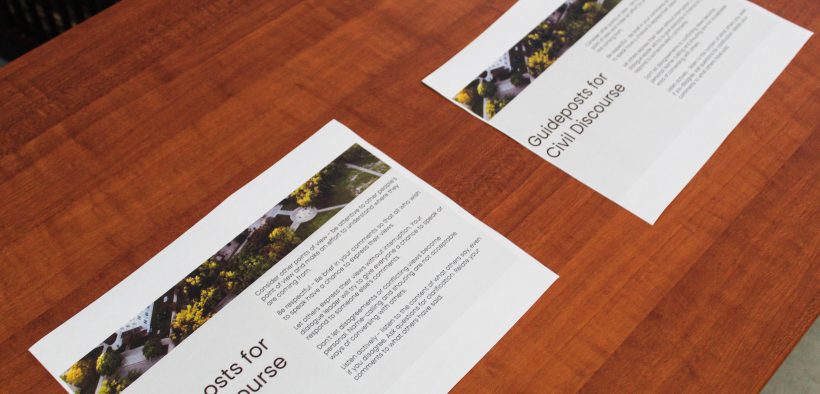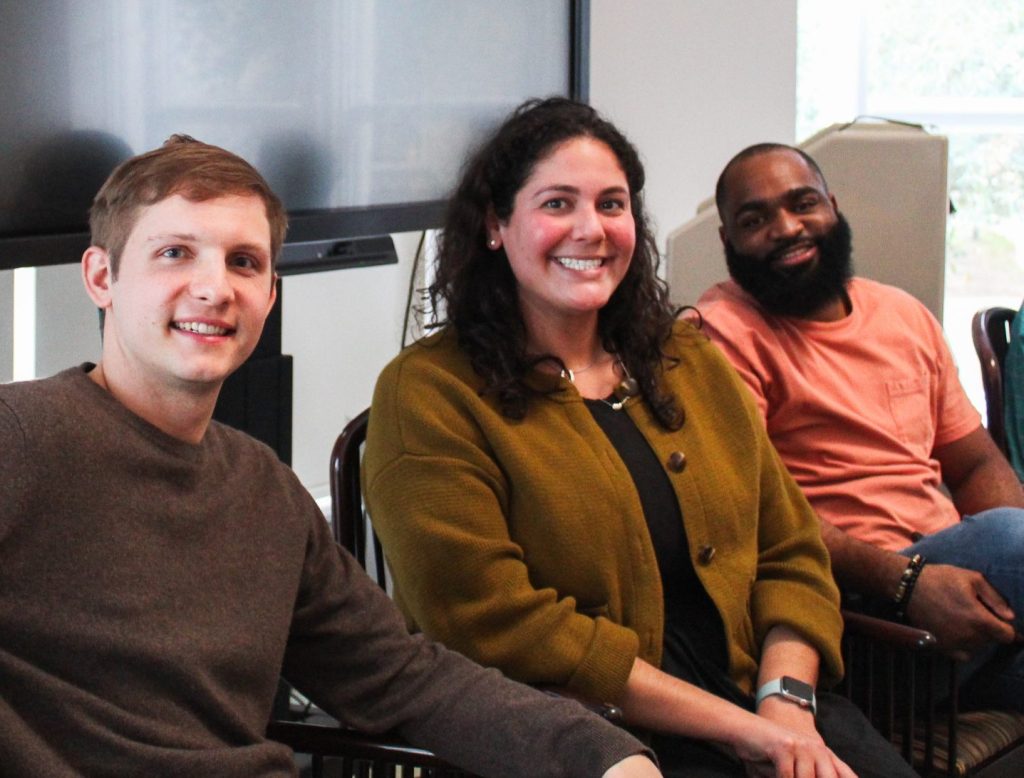SU Political Science Department Hosts Post-Election Roundtable
Share

On February 4th, 2025, Southwestern’s Political Science Department hosted a post-election roundtable discussion, a meeting intended to follow up on the pre-election roundtable discussion held back in October of 2024. Around 30 people attended the event in the library, with Dr. Bob Snyder, Dr. Alexander Goodwin, and Dr. Zoe Moss representing the Political Science Department; Dr. Joseph Hower and Dr. Paul Oshinski were also present as speakers at the roundtable from the History Department. The roundtable discussion was held in an effort to create a space for more open-ended civil discourse about the 2024 elections, in addition to providing some educated opinions on current events based on each professor’s field of expertise. Each professor took a few minutes to offer commentary concerning their own speciality, followed by a Q&A from those in attendance at the roundtable.
Dr. Hower began the discussion by emphasizing the decline of public support in major institutions, especially within the context of the elections in October, where the military and the police have been the only institutions to retain major public support. He balanced this observation with the statement that since at least the middle of the twentieth century, “the conservative movement has rhetorically more than programmatically declared war on government,” and that the conservative effort to “dramatically shrink and curtail the size and shape of the government” has resulted in this loss of public support for government institutions in general, such as healthcare.
Dr. Goodwin specializes in American politics, and connected the events of the 2024 elections with those of the 2008 elections, stating that “everything makes sense if you understand history, and understand social movement history in particular.” Dr. Goodwin called attention to the Post-Civil War and Reconstruction Era, and how progressive reforms at the time felt like “three steps forward, three steps back.” Similar pendulum swings occurred during the Civil Rights movement, where the Civil Rights Act, the Voting Rights Act, and the Fair Housing Act signaled progressive change, followed by inevitable retrenchment and resistance to that social progress. Dr. Goodwin likened this current period of time to a “third reconstruction,” and that, in terms of recent racial progress, “everything goes back to Barack Obama being elected on November 4th, 2008. We don’t get Donald Trump without Barack Obama, there just wouldn’t have been the public appetite for it.” In summary, the embrace of these conservative movements would not have been so fervent if not in response to the Obama administration that held office prior to Trump.
Dr. Moss focuses on feminist political theory in her work, and began her segment with a reference to Hannah Arendt, a German-American historian and political theorist who wrote a book titled The Origins of Totalitarianism in the wake of World War II. Arendt argued that “Terror can rule absolutely only over men who are isolated against each other.” Dr. Moss noted that it is the goal of authoritarian governments to bring about this isolation, and it is “reinforced by making people fear they cannot act in public because ‘no one will act with me’.” The key takeaway is that democracy will inevitably fall into tyranny if this isolation from each other is achieved.

Dr. Moss also introduced the voice of Sarah Ahmed, theorist and author of Living a Feminist Life. Ahmed draws on intersectional feminist writer and civil rights activist Audre Lorde in her work, and argues that self care is not self indulgent in the slightest. Furthermore, the people who dismiss the necessity of self care are those who are privileged enough that they do not have to struggle to care and provide for themselves. Dr. Moss argued that by merging these two ideas together, people can come together and form communities centered around caring for each other. This in turn can combat isolationism. Dr. Moss also emphasized the concept of “ruining dinner”: rather than being polite and cordial at the dinner table, don’t laugh at jokes that aren’t funny, call out macro and micro aggressions, and stand up for what is good and just. Even when friends and family members perpetuate what is not. Complacent silence at the dinner table inhibits meaningful connections, and encourages the very isolationism that threatens democracy. Dr. Moss stated: “It is our project to fight against all of these forces that are pushing for isolation… we have to believe that people will fight with us, even if we’ve ruined a few dinners.”
Dr. Oshinski discussed how exit polling data demonstrates that Trump secured a much more racially diverse coalition than expected, such as in Star County in Texas, where 58% of the vote turned out for Trump from a wide array of racial backgrounds. This is drastically different from exit polling data from Trump’s first presidential campaign, where 80% of the vote turned out for Hillary Clinton in 2016. Dr. Oshinski noted how young men and Latinos in particular are demographics that are increasingly shifting to the republican party. Dr. Oshinski also discussed how incumbency advantage is not as widespread anymore. Largely, Dr. Oshinki emphasized how this past election period, “we did not see a lot of ‘stolen election’ narratives” that have been common in the past, and republican trust in the institution of American elections has nearly doubled after this election. In theory, increased trust in democratic institutions is supposed to be good for the quality of democracy within a country. However, Dr. Oshinki stated that it is a dangerous path to follow when as a political party, you only place faith in elections your party wins, and likewise distrust the results of elections when your party does not win. This bias “spells doom for democracy.”
Dr. Bob Snyder was the last faculty member to speak at the panel, and specializes in international relations. Dr. Snyder stated that he finds it surprising that so many Americans felt so negatively about the Biden-Harris administration, since inflation was low and employment rate was up at the time of the election, while oil and gas production also increased during this administration: “If you gave any incumbent those numbers, that incumbent would be happy to run for reelection.” So, this begs the question: Why did so many Americans dislike the Biden-Harris administration? Dr. Snyder claimed that 72% of the electorate said “the country was on the wrong path” during this election. What does Trump’s election signify? Dr. Snyder noted how Trump was surrounded by billionaires at his inauguration: “Does Trump represent the fact that the American economy has become so highly oligarchic? Is American labor so uncompetitive that we have to have these tariffs?” Dr. Snyder concluded by confirming that Trump “is kind of an authoritarian figure,” and questioned whether Americans were looking for a new strongman in the absence of social mobility within the recent economy.
After each professor offered their expertise on what shape the new Trump administration has started taking since inauguration, multiple students at the discussion panel either shared their own opinions based on the professors’ words, or took the opportunity to ask questions of the faculty. The general consensus from the student body present at the roundtable was that democratic presidential candidate Kamala Harris was not given enough time to properly campaign against “strong man” Trump, she was too heavily associated with the Biden administration, and that most Americans were not prepared to vote a black woman into office. A handful of students raised more questions about Dr. Moss’s concept of “ruining dinner” in particular, one student saying: “Men want to be the most heard voice in the room, and it’s a threatening feeling to that entitlement when they’re told they shouldn’t be– they can’t use slurs anymore or make jokes at other people’s expense.” Dr. Moss raised more poignant questions: “Who’s dinner are we ruining? Who’s comfort are we prioritizing, and why?” A feeling of both anxiousness and anticipation closed the conversation as student questions came to an end; there’s no way to know how the next four years in the second Trump administration will go. All we can do is keep watching the news, and critically analyze the information being presented to us.
